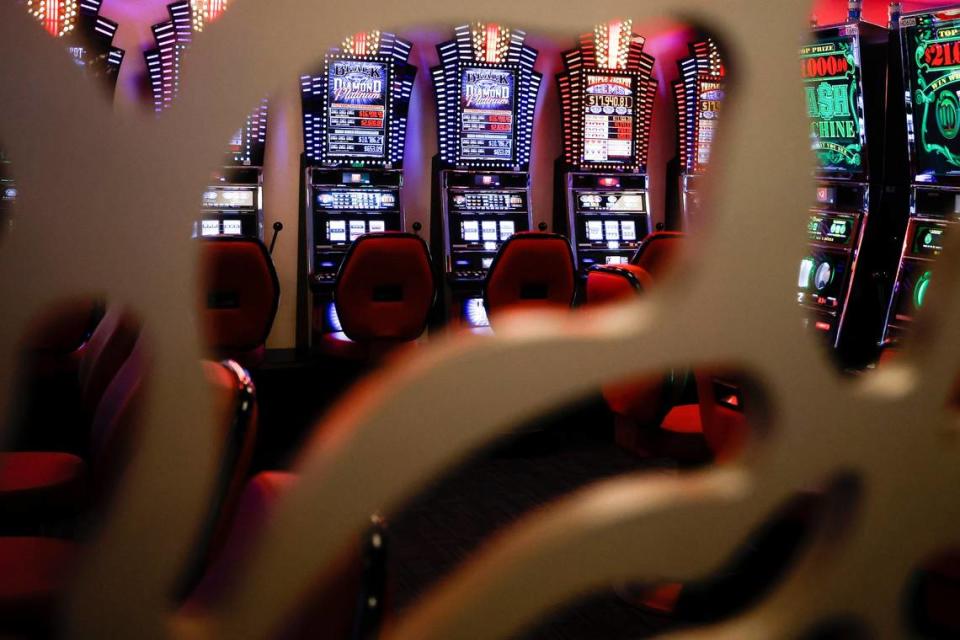Timeline of gambling in North Carolina: Legal casinos; games banished
North Carolina has banned gambling, in some capacity, for more than two centuries.
Today, the state permits gambling only with the state-run lottery, three Native American casinos and select bingo and raffle games.
Its Bible-Belt origin — ingrained in its laws and culture — kept many pastimes, like gambling, at bay for years.
Most recently, blacked-out windows cloaked a subculture of Charlotte’s nightlife: “skill game” arcades.
Rows of six-foot game tables equipped with a video game-like fish hunting program drew patrons in. The pastime, which grants some riches and robs others, is illegal, authorities say.
A court case first ruled the fish games violated state statues in 2021. But the case’s route through appellate courts stunted police’s ability to interfere. A final ruling in February allowed Mecklenburg County authorities to resume purging the area’s arcades, seizing machines and charging those who ran the games.
Here’s a look at types of gambling made legal and prohibited through the years.
Timeline: Gambling in North Carolina
Bingo and raffles: Mecklenburg County legalized bingo at fairs and exhibitions in 1954, but statewide laws in 1979 replaced varying county legislation. It allowed non-profit organizations to run bingo and raffles and mandated unregulated games’ prizes not exceed $10.
Casinos: Today, three casinos across North Carolina offer sports betting, table games, slot machines and poker. In 1997, Harrah’s Cherokee Casino opened, marking the state’s first Native-American-run casino, and, in 2015, it’s Cherokee Valley River Casino opened in Murphy. Kings Mountain promises to house the state’s next operation: the $273 million Catawba Two Kings Casino Resort. Its temporary facility currently houses 1,000 machines, and its sportsbook opened in September.

Video poker and sweepstakes: Once a widespread pastime available in many North Carolina sports bars, 2000 legislation cracked down on video poker machines, allowing only three in one location. In 2013, the General Assembly outlawed video sweepstakes in an effort to shut down sweepstakes parlors, which operated in a legal gray area by offering patrons chances to win prizes when they bought something — usually internet or phone access.
Fish games and “skill arcades”: Games evolved to look less like video poker or sweepstakes machines and more like those found in recreational arcades for kids. The most popular in many cities became fish game tables — where players buy “ammo” and win based on which targets they “shoot” or hit. These games appeared in North Carolina starting around 2016. Through legal tangles that arose from early police raids, the North Carolina Supreme Court recently ruled these games violate state law. More than 100 of the all-cash businesses closed in the last year in Charlotte, according to police.
Lottery: In 2005, Gov. Mike Easley signed the state’s Education Lottery into law. Powerball sales began the following year, and North Carolinians won the most prizes yet after raising nearly $930 million for education programs through ticket purchases, according to the Education Lottery’s website.
Sports betting: In 2018, the U.S. Supreme Court struck down the Professional and Amateur Sports Protection Act of 1992, allowing states to make their own laws. By 2019, sports wagering was allowed on North Carolina’s tribal lands. In 2021, the first sports bet was placed at Harrah’s Cherokee Casino, and new legislation that would allow more widespread sports betting via mobile devices entered the Senate. A new bill Gov. Roy Cooper said he expects to pass was filed in General Assembly earlier this year and recently advanced in the House.

